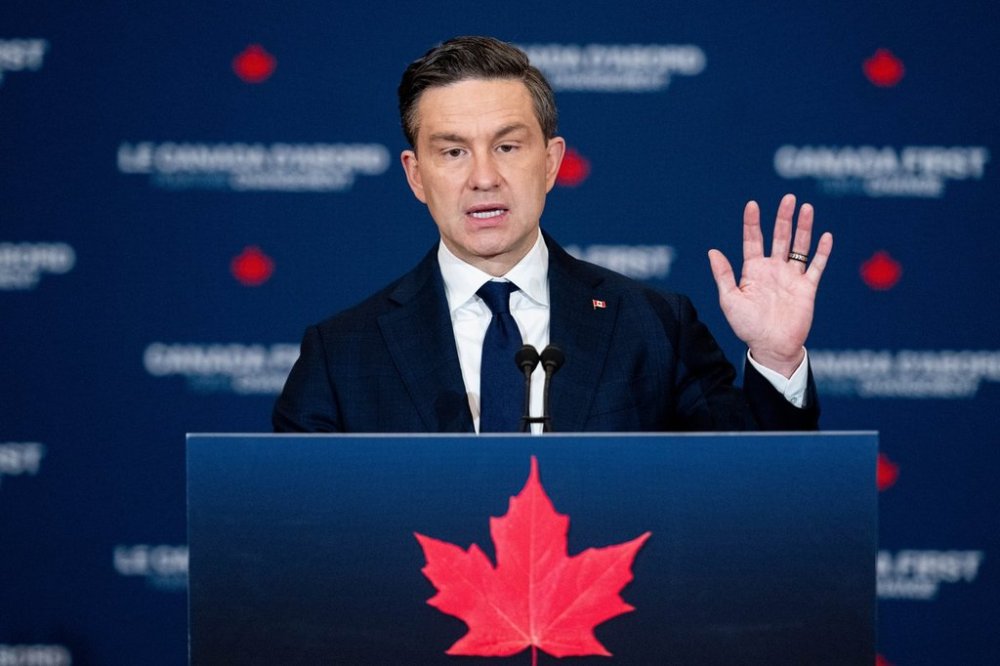Poilievre’s pledge to use notwithstanding clause a ‘dangerous sign’: legal expert
Advertisement
Read this article for free:
or
Already have an account? Log in here »
To continue reading, please subscribe:
Monthly Digital Subscription
$0 for the first 4 weeks*
- Enjoy unlimited reading on winnipegfreepress.com
- Read the E-Edition, our digital replica newspaper
- Access News Break, our award-winning app
- Play interactive puzzles
*No charge for 4 weeks then price increases to the regular rate of $19.00 plus GST every four weeks. Offer available to new and qualified returning subscribers only. Cancel any time.
Monthly Digital Subscription
$4.75/week*
- Enjoy unlimited reading on winnipegfreepress.com
- Read the E-Edition, our digital replica newspaper
- Access News Break, our award-winning app
- Play interactive puzzles
*Billed as $19 plus GST every four weeks. Cancel any time.
To continue reading, please subscribe:
Add Free Press access to your Brandon Sun subscription for only an additional
$1 for the first 4 weeks*
*Your next subscription payment will increase by $1.00 and you will be charged $16.99 plus GST for four weeks. After four weeks, your payment will increase to $23.99 plus GST every four weeks.
Read unlimited articles for free today:
or
Already have an account? Log in here »
Hey there, time traveller!
This article was published 14/04/2025 (224 days ago), so information in it may no longer be current.
MONTREAL – Conservative Leader Pierre Poilievre is promising to use the notwithstanding clause to impose consecutive life sentences for multiple murders — a pledge one constitutional expert calls “a very dangerous sign.”
Unveiling another plank of his tough-on-crime agenda Monday, Poilievre said a Conservative government would give judges the power to sentence people who’ve been convicted of multiple murders to consecutive life sentences, with parole ineligibility beyond 25 years.
“The worst mass murderers should never be allowed back on the streets,” Poilievre told reporters in Montreal. “For them, a life sentence should be what it says: a life sentence. They should only come out in a box.”

Conservative Party Leader Pierre Poilievre holds a press conference in Ottawa, on Sunday, April 13, 2025. THE CANADIAN PRESS/Spencer Colby
The Supreme Court of Canada ruled in 2022 that imposing consecutive life sentences violates an offender’s Charter rights. Justice Richard Wagner wrote in a unanimous decision that the provision allowing stacked sentences introduced by Stephen Harper’s Conservatives in 2011 was “incompatible with human dignity” and “amounts to cruel and unusual punishment.”
To get around that, Poilievre said he would use the notwithstanding clause, which allows the government to override some Charter rights for a limited time.
No federal government has ever used the notwithstanding clause, also known as Section 33 of the Canadian Charter of Rights and Freedoms, to pass a law.
Poilievre said he would use Parliament’s “legitimate constitutional authority” to protect the Charter rights of law-abiding Canadians to life, liberty and security.
People convicted of first-degree murder in Canada are automatically sentenced to life in prison — with no guarantee that they’ll ever be set free. The law proposed by Poilievre would allow a court to impose periods of parole ineligibility of 50, 75 or even 100 years, instead of the current limit of 25 years.
Poilievre cited the case of Alexandre Bissonnette, who gunned down six people in a Quebec City mosque in 2017, and Justin Bourque, who used a semi-automatic rifle to murder three Mounties in Moncton, N.B. in 2014. Bissonnette originally was sentenced to a 40-year period of parole ineligibility while Bourque’s period was 75 years; both ineligibility periods were reduced to 25 years after the Supreme Court decision.
The Conservative leader said it’s “insane” that Bissonnette could be released after 25 years. “That works out to four years of jail time for every murder he committed,” he said.
Asked to provide an example of a mass murderer in Canada who was released after only 25 years, Poilievre said it’s too soon to do so because the law was only overturned in 2022. But he said his proposed law would also spare victims from having to testify at parole hearings.
“When you kill six people, you should never be eligible for parole,” he said. “You should never be able to force the families of the victims to have to come and testify at a parole hearing so that they relive the hell you’ve exacted on them.”
Poilievre has previously proposed a “three strikes” law that would impose a minimum sentences on those convicted three times of serious offences, and make them ineligible for bail, probation, parole or house arrest.
He also has promised tougher sentences for those convicted of intimate partner violence.
Louis-Philippe Lampron, a law professor with Université Laval, said it’s no surprise that a federal leader has proposed invoking the notwithstanding clause, given its increasing use in recent years by premiers such as Quebec’s François Legault. Legault has used the clause to partially shield secularism and language laws from court challenges — and used it pre-emptively in both cases.
“Since then, suggestions for using what is essentially a bazooka in terms of protection of human rights and freedoms are multiplying,” Lampron said in a phone interview.
He said that nothing prevents the Conservatives from using the clause, since few limits have been placed on how it can be invoked. He added that the Supreme Court is expected to weigh in on the criteria surrounding its use during upcoming hearings on the Quebec secularism law.

Conservative Party leader Pierre Poilievre speaks during a federal election campaign stop in Montreal, Monday, April 14, 2025. THE CANADIAN PRESS/Graham Hughes
Montreal-based constitutional lawyer Julius Grey said it’s a “very dangerous sign” to see a party leader campaigning on using the clause.
“I think it is certainly a very dangerous sign to see an opposition leader in the middle of an election campaign try to use the notwithstanding clause as a way of getting approval. It of course would be very unfortunate if Canadians lost sight of the fact that every time you use the notwithstanding clause, everybody’s liberty is diminished,” he said.
Grey said there’s no need for consecutive life sentences, he added, because spending at least 25 years behind bars is “no joke.”
“I don’t see how much more consecutive sentences would do,” he said. “They would take away that last glimmer of hope, in the way they do in the United States where people are sentenced to a total of 150 years or whatever, and I don’t think that’s either wise nor morally right.”
Asked about Poilievre’s announcement Monday, Liberal Leader Mark Carney said using the notwithstanding clause is a “dangerous step.”
“We have a charter of rights and fundamental freedoms in this country, and it’s the responsibility, in my view, of the prime minister and the government of Canada to defend that charter,” Carney said at a press conference. “Politicizing certain issues with respect to fundamental rights is a slippery slope that leads to further politicization.”
NDP Leader Jagmeet Singh said the notwithstanding clause “should not be used” to override Charter rights and expressed confidence in the justice system’s ability to punish offenders.
“We obviously need to have severe penalties for people that commit horrible crimes, and right now we have that ability,” he said in Toronto.
Poilievre did not rule out using the notwithstanding clause to shield other laws but said he would only do so to fight crime.
This report by The Canadian Press was first published April 14, 2025.
Note to readers:This is a corrected version. An earlier version said NDP Leader Jagmeet Singh was campaigning in Montreal.



















